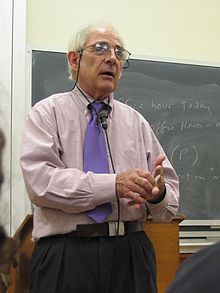John Searle | |
|---|---|
 Searle at Christ Church, Oxford, 2005 | |
| Born | John Rogers Searle July 31, 1932 Denver, Colorado, U.S. |
| Alma mater | University of Wisconsin–Madison Christ Church, Oxford |
| Spouse | Dagmar Searle[3] |
| Era | Contemporary philosophy |
| Region | Western philosophy |
| School | Analytic Direct realism[1] |
| Thesis | Problems arising in the theory of meaning out of the notions of sense and reference (1959) |
| Academic advisors | Peter Strawson, Peter Geach, J.L. Austin |
| Doctoral students | Bence Nanay[2] |
| Other notable students | William Hirstein |
Main interests | |
Notable ideas | Indirect speech acts Chinese room Biological naturalism Direction of fit |
| Signature | |
John Rogers Searle (American English pronunciation: /sɜːrl/; born July 31, 1932)[4] is an American philosopher widely noted for contributions to the philosophy of language, philosophy of mind, and social philosophy. He began teaching at UC Berkeley in 1959, and was Willis S. and Marion Slusser Professor Emeritus of the Philosophy of Mind and Language and Professor of the Graduate School at the University of California, Berkeley, until June 2019, when his status as professor emeritus was revoked because he was found to have violated the university's sexual harassment policies.[5]
As an undergraduate at the University of Wisconsin–Madison, Searle was secretary of "Students against Joseph McCarthy". He received all his university degrees, BA, MA, and DPhil, from the University of Oxford, where he held his first faculty positions. Later, at UC Berkeley, he became the first tenured professor to join the 1964–1965 Free Speech Movement. In the late 1980s, Searle challenged the restrictions of Berkeley's 1980 rent stabilization ordinance. Following what came to be known as the California Supreme Court's "Searle Decision" of 1990, Berkeley changed its rent control policy, leading to large rent increases between 1991 and 1994.
In 2000, Searle received the Jean Nicod Prize;[6] in 2004, the National Humanities Medal;[7] and in 2006, the Mind & Brain Prize. In 2010 he was elected to the American Philosophical Society.[8] Searle's early work on speech acts, influenced by J. L. Austin and Ludwig Wittgenstein, helped establish his reputation. His notable concepts include the "Chinese room" argument against "strong" artificial intelligence.
- ^ John R. Searle, Seeing Things as They Are: A Theory of Perception, Oxford University Press, 2015, p. 15.
- ^ "Humboldt Research Award". www.ruhr-uni-bochum.de.
- ^ "Introduction: John Searle in Czech Context" (PDF). Sav.sk. 2012. Retrieved April 21, 2017.
- ^ Shook, John R. (January 1, 2005). Dictionary of Modern American Philosophers. A&C Black. p. 2175. ISBN 978-1-84371-037-0.
- ^ Cite error: The named reference
HarrPolViolwas invoked but never defined (see the help page). - ^ "Jean-Nicod 2000 Prize". Archived from the original on September 23, 2015. Retrieved June 11, 2015.
- ^ "President Bush Awards 2004 National Humanities Medals". NEH.gov. Retrieved April 21, 2017.
- ^ "APS Member History". search.amphilsoc.org. Retrieved April 21, 2021.